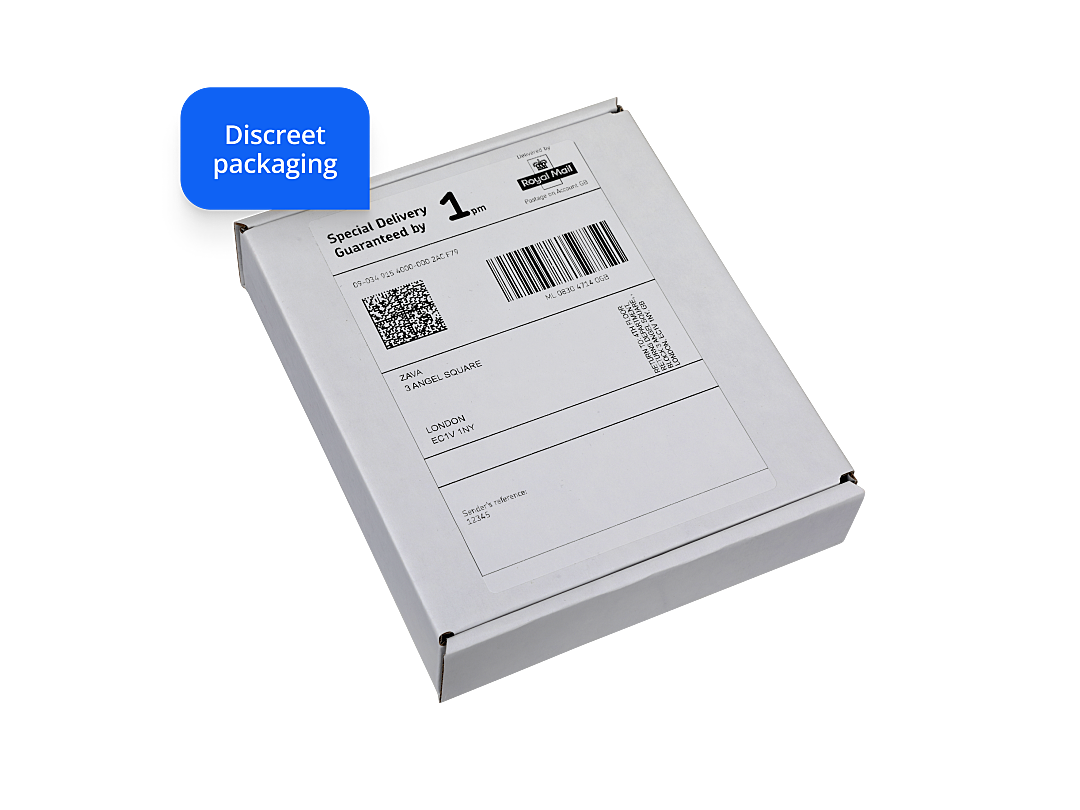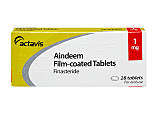Finasteride Tablets
Finasteride 1mg tablets are a generic medication used to treat and prevent male pattern baldness in men.




Prices from £19.95
In stock. Simply fill in a brief consultation questionnaire and one of our doctors will review your request today.
-
Finasteride is a treatment for male pattern hair loss in men. It comes as a generic tablet, finasteride, or under the brand name Propecia. Finasteride can prevent hair loss and increase hair growth.
To treat male pattern hair loss, 1mg of finasteride should be taken daily. You usually need to take finasteride for at least 3 to 6 months to see its full effect.
Prices
28 tablet(s) / 1 mg - £19.95
56 tablet(s) / 1 mg - £34.95
84 tablet(s) / 1 mg - £44.95
168 tablet(s) / 1 mg - £79.95



About finasteride
-
-
Finasteride is used in the treatment of male pattern hair loss, which is also called androgenetic alopecia. It belongs to a group of medicines known as 5- alpha-reductase inhibitors. Finasteride can prevent further male pattern hair loss and increase hair growth, in men with mild or moderate hair loss.
-
-
Finasteride is a 5- alpha-reductase inhibitor. Finasteride lowers the levels of an androgen called DHT (dihydrotestosterone), which is one of the main causes of male pattern hair loss. When taking finasteride once a day, your levels of DHT will become lower, preventing further hair loss and increasing hair growth.
-
-
Finasteride 1mg tablets should be taken once a day, by mouth. You can take the tablet with or without food, and with a glass of water. Never divide or crush your tablet. Do not take more than 1 tablet each day. You can drink alcohol whilst taking finasteride.
What if I miss a dose?
If you miss a dose, take your next tablet when it is due. Do not take a double dose or take more finasteride than you should, as this will not make it work faster.
-
-
Finasteride has been found to maintain hair or visibly improve hair in 90% of men when taken every day for 5 years. You may need to take finasteride for 3 to 6 months before you see an improvement. Finasteride is most effective when taken every day and is safe to be taken for a long time.
Finasteride is only effective while you are taking it. After stopping the treatment, the improvements will usually start to reverse by 6 months and return to a baseline level by 9 to 12 months.
-
-
Finasteride can cause some side effects, although not every man will get them. You should stop taking the tablets straight away and speak to your doctor if you get:
- depression
- symptoms of an allergic reaction, such as breathing difficulties and swelling
Uncommon side effects include:
- erectile dysfunction
- change in sex drive
- problems with ejaculation, such as a decrease in semen
There are some other side effects, although how often these happen is not known. For a full list of side effects please read the patient information leaflet inside your finasteride packet, or online. If you get side effects that do not go away, speak with your doctor.
If you are due to have a blood test for prostate cancer called prostate-specific antigen (PSA), you must speak to your doctor before taking finasteride, as it could affect the results.
-
-
Finasteride is suitable for men over the age of 18 who have male pattern hair loss. It should not be taken by women. You should not take finasteride if you are allergic to any of the ingredients in the tablets. Our doctors will make sure it is suitable for you to take finasteride before they prescribe it to you.
The effectiveness of finasteride for men over the age of 41 has not been confirmed, and it may not work as well in this age group. The use of generic finasteride for hair loss in men over the age of 41 is an “off label” use. It is still felt to be safe and beneficial by healthcare professionals but it is not within the original license of the medication.
Propecia, the branded version of finasteride, is licensed for use by men over 41 years.
Finasteride should be avoided by pregnant women, as it can affect an unborn male baby. Pregnant women should not handle finasteride, especially if the tablet has been broken or crushed. If your sexual partner is pregnant, you must use a condom or stop taking finasteride.
-
-
Finasteride is not known to interact with any medication but tell your doctor before taking finasteride if you are taking any other medications. Finasteride is not known to interact with any food or drinks.
-
-
ZAVA currently stocks finasteride and Propecia for male pattern hair loss. Propecia is the branded version of finasteride. Minoxidil is another treatment for male pattern hair loss and is a foam applied to the scalp. There are other forms of treatment if you do not want to take medication, such as:
- wigs
- steroid injections or creams
- light treatment
- immunotherapy
- tattooing
- hair transplant
- scalp reduction surgery
Some of these alternative treatments may be available on the NHS, but you must speak to your doctor first. If you are not eligible, you will have to pay for private treatment.
-
-
Finasteride can be found on the NHS for treatment of an enlarged prostate but can only be prescribed privately for male pattern hair loss.
-
-
There is no cure for male pattern hair loss but finasteride can stop it from getting worse, whilst you are taking it.
-
-
You should speak to your doctor before you stop taking finasteride. If you stop your treatment, it will stop working. This means you will lose any hair you have gained whilst taking finasteride within 9 to 12 months.
-
-
Propecia is a brand name for finasteride. Both medicines contain the same active ingredients and are used in the same way. Finasteride is also used in higher doses to treat medical conditions such as an enlarged prostate, but 1mg of Propecia and finasteride are both equally effective.
-
-
Free Standard Delivery – Free
This will be contactless delivery. No signature will be required, and your parcel will be left on your doorstep. We dispatch orders every day from Monday to Friday. If placed before 4pm, your order will be dispatched the same day. Orders placed after 4pm will be processed and sent out the next working day.
Next Day Click & Collect – Free
Collect your order from any Royal Mail post office. You will receive an email or SMS as soon as your order is ready for collection. Your order will be available to collect from the Post Office for up to 18 days. Proof of Identification will be required for collection.
Next day delivery – £3.99
This will be a contactless delivery but will require someone to be home to receive the item. If placed before 4pm, your order will be delivered the next working day.
You'll be asked to choose a delivery option when you check out. Options may vary depending on the pack size and dose you choose. You can find out more about delivery and collection options, on our delivery page.

Dr Kathryn Basford is a qualified GP who works as a GP in London, as well as with ZAVA. She graduated from the University of Manchester and completed her GP training through Whipps Cross Hospital in London.
Meet our doctorsLast reviewed: 13 Jan 2022
-
Finasteride, National Health Service [accessed November 2021]
-
Finasteride 1 mg Film-coated Tablets, Patient Information Leaflet, EMC[accessed November 2021]
-
Finasteride: a review of its use in male pattern hair loss, PubMed [accessed November 2021]
-
Hair loss, National Health Service [accessed November 2021]
As well as topical treatments like shampoos, you can also treat your hair loss with oral tablets. ZAVA offers both shampoos and oral tablets to help reduce hair loss and promote new hair growth.








